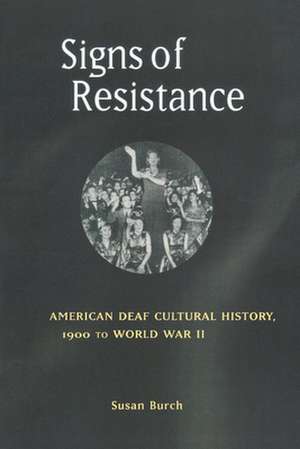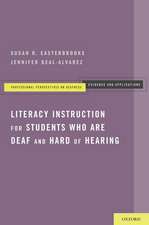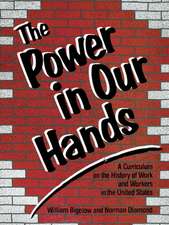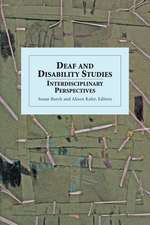Signs of Resistance – American Deaf Cultural History, 1900 to World War II
Autor Susan Burchen Limba Engleză Paperback – 31 oct 2004
| Toate formatele și edițiile | Preț | Express |
|---|---|---|
| Paperback (1) | 224.55 lei 6-8 săpt. | |
| MI – New York University – 31 oct 2004 | 224.55 lei 6-8 săpt. | |
| Hardback (1) | 525.26 lei 6-8 săpt. | |
| Wiley – 31 oct 2002 | 525.26 lei 6-8 săpt. |
Preț: 224.55 lei
Nou
Puncte Express: 337
Preț estimativ în valută:
42.97€ • 44.61$ • 35.83£
42.97€ • 44.61$ • 35.83£
Carte tipărită la comandă
Livrare economică 25 martie-08 aprilie
Preluare comenzi: 021 569.72.76
Specificații
ISBN-13: 9780814798942
ISBN-10: 0814798942
Pagini: 230
Ilustrații: halftones
Dimensiuni: 152 x 229 x 13 mm
Greutate: 0.34 kg
Editura: MI – New York University
ISBN-10: 0814798942
Pagini: 230
Ilustrații: halftones
Dimensiuni: 152 x 229 x 13 mm
Greutate: 0.34 kg
Editura: MI – New York University
Recenzii
"Burch's rich and well-researched chronicle of the U.S. Deaf community's efforts to claim and shape their full participation in public life between 1900 and 1942 reminds historians of the many forms debates have taken in U.S. History regarding how a proper citizen should look, act, and speak."
Reviews in American History "Burch offers insightful comparisons. Her book is important to the fields of Deaf studies and disability studies, but it will appeal to social historians as well."
Journal of American History "Forcefully and gracefully narrates Deaf people's dramatic struggle against hearing oppression in the early twentieth century. Incorporating new data from archival research and community interviews, Burch applies tools of social analysis to challenge earlier interpretations that underestimated Deaf people's success in preserving their core values. The resulting study is fascinating and important to students of American social history and disability."
John Van Cleve, Gallaudet University
"Burch's rich and well-researched chronicle of the U.S. Deaf community's efforts to claim and shape their full participation in public life between 1900 and 1942 reminds historians of the many forms debates have taken in U.S. History regarding how a proper citizen should look, act, and speak." --Reviews in American History "Burch offers insightful comparisons. Her book is important to the fields of Deaf studies and disability studies, but it will appeal to social historians as well." --Journal of American History "Forcefully and gracefully narrates Deaf people's dramatic struggle against hearing oppression in the early twentieth century. Incorporating new data from archival research and community interviews, Burch applies tools of social analysis to challenge earlier interpretations that underestimated Deaf people's success in preserving their core values. The resulting study is fascinating and important to students of American social history and disability." --John Van Cleve, Gallaudet University
Reviews in American History "Burch offers insightful comparisons. Her book is important to the fields of Deaf studies and disability studies, but it will appeal to social historians as well."
Journal of American History "Forcefully and gracefully narrates Deaf people's dramatic struggle against hearing oppression in the early twentieth century. Incorporating new data from archival research and community interviews, Burch applies tools of social analysis to challenge earlier interpretations that underestimated Deaf people's success in preserving their core values. The resulting study is fascinating and important to students of American social history and disability."
John Van Cleve, Gallaudet University
"Burch's rich and well-researched chronicle of the U.S. Deaf community's efforts to claim and shape their full participation in public life between 1900 and 1942 reminds historians of the many forms debates have taken in U.S. History regarding how a proper citizen should look, act, and speak." --Reviews in American History "Burch offers insightful comparisons. Her book is important to the fields of Deaf studies and disability studies, but it will appeal to social historians as well." --Journal of American History "Forcefully and gracefully narrates Deaf people's dramatic struggle against hearing oppression in the early twentieth century. Incorporating new data from archival research and community interviews, Burch applies tools of social analysis to challenge earlier interpretations that underestimated Deaf people's success in preserving their core values. The resulting study is fascinating and important to students of American social history and disability." --John Van Cleve, Gallaudet University






















